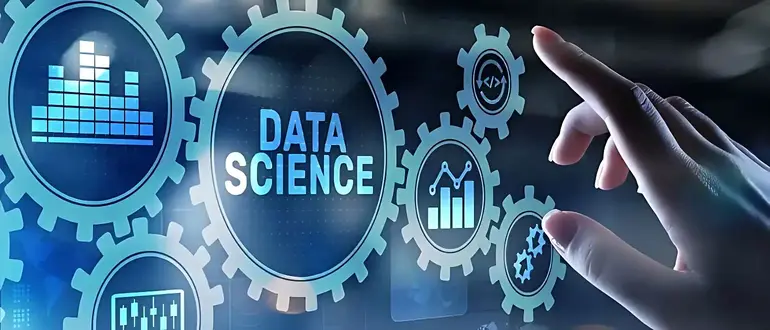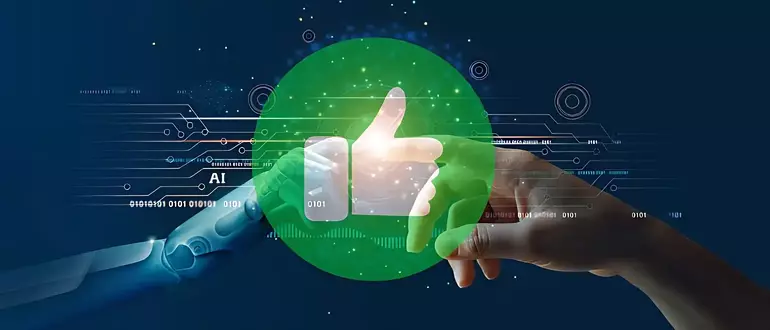As artificial intelligence continues to advance rapidly, many are questioning the role of data scientists in the future of data analysis.
Will AI completely replace these experts, or will they continue to play a crucial role in the field?
In this blog post, we’ll explore the potential impact of AI on data science and examine whether or not it will ever be able to replace data scientists fully.

Will AI Replace Data Scientists?
No, AI will not replace data scientists.
While AI can automate some tasks, it still requires human expertise to design and interpret algorithms, understand results, and bring valuable domain knowledge and business insights.
AI can enhance the work of data scientists, but it will remain critical for organizations to make sense of data relevant to their goals.
What Is The Impact Of AI On The Job Market For Data Scientists?

Increasing Demand for Specialized Skills
One potential impact of AI on the job market for data scientists is the increasing demand for specialized skills.
As AI becomes more prevalent, there is a growing need for data scientists who have expertise in areas such as machine learning, natural language processing, and computer vision.
This has led to a rise in demand for data scientists with advanced degrees and specialized training.
Increased Efficiency
One of the most significant impacts of AI on the job market for data scientists is increased efficiency.
AI has made it possible to automate many of the tasks that were previously done manually by data scientists.
This includes data cleaning, data analysis, and even model selection. As a result, data scientists are able to focus on more complex tasks that require human expertise, such as designing experiments and interpreting results.
Automation of Data-related Tasks
Another impact of AI on the job market for data scientists is the automation of some data-related tasks.
As AI technologies become more sophisticated, some routine data tasks, such as data cleaning and feature selection, can be automated.
This has led to some concern that AI could replace human data scientists in some areas.
New Opportunities
Another impact of AI on the job market for data scientists is the creation of new opportunities.
AI has opened up new areas of research and development that were previously inaccessible due to the lack of computing power and data availability.
This has led to the creation of new roles such as AI engineer, machine learning engineer, and data analyst.
These roles require a different set of skills than traditional data science roles and provide an opportunity for data scientists to upskill and transition to these new roles.
Challenges
Despite the opportunities that AI has created, it has also presented several challenges for data scientists.
One of the most significant challenges is the need to constantly upskill and stay updated with the latest developments in AI.
This requires a significant investment in time and resources and can be a challenge for data scientists who are already overloaded with work.
Another challenge is the potential for AI to replace certain aspects of the data scientist’s role.
For example, automated machine learning tools can be used to select and tune models, reducing the need for human intervention.
This can lead to a reduction in the demand for traditional data science roles, particularly in industries that are heavily reliant on automation.
What Skills Are Required For A Data Scientist To Hold Their Job In The Era Of AI?

Strong Foundation in Statistics and Mathematics
One of the foundational skills required for a data scientist is a strong understanding of statistics and mathematics.
With AI, the amount of data that can be collected and analyzed has increased exponentially.
Therefore, a data scientist needs to have a strong grasp of statistical analysis, including data modeling, regression analysis, and hypothesis testing.
Additionally, a deep understanding of mathematical concepts such as linear algebra, calculus, and optimization is necessary to build and fine-tune machine learning algorithms.
Programming Skills
Programming is another essential skill for data scientists in the era of AI. Python and R are the most commonly used programming languages for data science.
A data scientist must have a strong command of these programming languages to handle large data sets, automate data cleaning and preprocessing, build machine learning models, and deploy models to production.
Understanding of Machine Learning Algorithms
Machine learning algorithms are a fundamental aspect of AI. A data scientist must have a comprehensive understanding of machine learning algorithms and how they work.
This includes supervised and unsupervised learning, deep learning, and reinforcement learning.
The ability to select the appropriate algorithm based on the type of problem and data set is crucial in building accurate models.
Familiarity with Big Data Technologies
As the volume of data being generated and collected continues to grow, data scientists must be familiar with big data technologies.
Technologies such as Hadoop, Spark, and NoSQL databases are used to store, process, and analyze large data sets.
A data scientist must have a strong grasp of these technologies and know how to work with them to extract insights from large data sets.
Communication Skills
A data scientist must be an excellent communicator. The ability to communicate effectively with stakeholders, such as executives, managers, and other members of the team, is crucial.
This includes the ability to explain complex concepts, present findings, and make recommendations to decision-makers.
A data scientist must be able to communicate insights derived from data in a clear, concise, and actionable manner.
Creativity and Problem-Solving Skills
Finally, a data scientist must be creative and have strong problem-solving skills.
As the field of AI continues to evolve, new challenges will arise that require innovative solutions.
A data scientist must be able to think critically and creatively to solve problems and identify new opportunities.
What Are The Advantages Of Using AI In Data Science?

Automated Data Analysis:
One of the main advantages of using AI in Data Science is the ability to automate many of the repetitive tasks that are required in data analysis.
These tasks can include data cleaning, feature selection, and model selection. By automating these tasks, data scientists can save time and focus on more complex analyses that require human expertise.
For example, machine learning algorithms can be used to automate the process of selecting the best model for a given dataset.
This process can involve testing multiple models and selecting the one that performs the best.
AI can automate this process by testing a range of models and selecting the best one based on performance metrics.
Improved Accuracy:
AI algorithms can be trained to detect patterns in data that may be difficult for humans to recognize.
This can lead to more accurate predictions and better decision-making. For example, AI can be used to detect patterns in medical data that can help diagnose diseases or predict outcomes.
In addition, AI can be used to reduce human error in data analysis. Humans are prone to making mistakes, such as misinterpreting data or selecting the wrong model.
AI algorithms can reduce these errors by automating many of the data analysis tasks and using machine learning to improve the accuracy of predictions.
Better Insights:
By analyzing large amounts of data, AI algorithms can identify correlations and trends that may not be immediately apparent to humans.
This can lead to new insights and discoveries that can be used to improve business operations or solve complex problems.
For example, AI can be used to identify patterns in customer behavior that can help businesses improve their marketing strategies.
In addition, AI can be used to generate new data that can be used for analysis.
For example, generative adversarial networks (GANs) can be used to generate new images or text that can be used for training machine learning models.
This can help improve the accuracy of predictions and lead to new discoveries.
Real-time Data Analysis:
AI algorithms can be designed to analyze data in real-time, allowing organizations to respond quickly to changes in the market or customer behavior.
For example, AI can be used to monitor social media for mentions of a brand or product.
This can help businesses respond quickly to customer complaints or identify trends in customer behavior.
In addition, real-time data analysis can be used for predictive maintenance.
AI can be used to monitor the performance of machines and predict when maintenance is needed. This can help prevent downtime and reduce maintenance costs.
Cost Savings:
By automating many of the data analysis tasks, AI can help reduce the costs associated with data science.
This can allow organizations to allocate resources to other areas of the business. For example,
AI can be used to automate data entry tasks, reducing the need for human input. This can save time and reduce the risk of human error.
What Are The Disadvantages Of Using AI In Data Science?

Limited Creativity and Intuition
One of the main disadvantages of using AI in data science is that AI lacks human creativity and intuition.
AI is programmed to perform specific tasks based on the data it is trained on, and it lacks the ability to think creatively and come up with innovative solutions to problems that may not be explicitly stated in the data.
Biased Outcomes
Another disadvantage of using AI in data science is the risk of biased outcomes.
AI algorithms rely on the data they are trained on to make decisions, and if the data is biased, then the outcomes will be biased as well.
This can have significant negative impacts on various sectors, such as finance and healthcare, where unbiased decisions are critical.
Lack of Transparency
The lack of transparency in AI algorithms is another major disadvantage.
In many cases, it is difficult to understand how an AI algorithm arrived at a particular decision, making it challenging to identify and correct errors.
This can be a significant issue in critical decision-making processes, such as medical diagnoses or credit scoring.
Data Quality
AI algorithms require high-quality data to produce accurate outcomes. Poor-quality data can result in inaccurate predictions and unreliable outcomes.
Moreover, AI algorithms are unable to detect poor-quality data and may even amplify errors, leading to poor decision-making.
High Cost and Complexity
Finally, implementing AI in data science can be a costly and complex undertaking.
Developing and maintaining AI algorithms requires significant investment in both time and resources, and not all organizations have the budget or expertise to undertake such projects.
FAQs
What Are Some Of The Tasks That AI Can Automate In Data Science?
AI has the potential to automate many data-related tasks, such as data collection, data cleaning, data preprocessing, and data analysis.
In addition, AI can automate the deployment of models into production, generate variations of models, and build basic models through intuitive interfaces.
What Are Some Of The Tasks That Require Human Expertise In Data Science?
Tasks requiring human expertise include developing data collection and analysis strategies, identifying relevant features for prediction, interpreting results, and communicating findings to stakeholders.
In addition, data scientists often have domain-specific knowledge and business acumen that is difficult for AI to replicate.
Can AI Be Trained To Perform Tasks Requiring Human Data Science Expertise?
While AI has made significant progress in many areas of data analysis, it is challenging to train AI to replicate the intuition, creativity, and expertise of a human data scientist.
However, AI can assist data scientists in performing certain tasks, such as identifying relevant features for prediction and building models.
Will The Role Of Data Scientists Change As AI Becomes More Prevalent?
The role of data scientists is likely to evolve as AI becomes more prevalent.
Data scientists will need to prioritize higher-value tasks, such as developing data collection and analysis strategies, interpreting results, and communicating findings to stakeholders.
In addition, data scientists may need to develop new skills to work with AI and integrate it into their workflow.
Will There Be A Need For Human Oversight Of AI In Data Science?
Yes, there will be a need for human oversight of AI in data science. AI is not infallible and can have baked-in assumptions, confounding biases, and errors.
Data scientists will need to act as “data cops,” challenging.
Conclusion
While AI has made significant strides in automating tasks traditionally performed by data scientists, it is unlikely to replace them completely.
Data scientists bring a unique blend of domain expertise, creativity, and critical thinking to the table, making them indispensable in a world that relies heavily on data-driven decision-making.
As AI continues to evolve, data scientists will continue to adapt and leverage this technology to enhance their work, leading to more efficient and effective insights.




